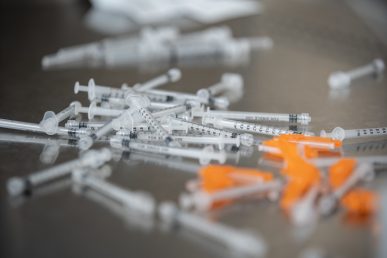New study looks at vaccine hesitancy among workers in health care
According to a new study by researchers at the University of Illinois Chicago, approximately 3 in 20 health care workers surveyed reported being hesitant about getting their COVID-19 vaccinations. The study also showed workers’ vaccine decisions were likely to be influenced by their colleagues.
For their study, “COVID-19 Vaccination Hesitancy among Health Care Workers, Communication and Policy-Making,” researchers surveyed health care workers at three local health care systems: UI Health, Rush University Medical Center and Advocate Aurora Health. The results are published in the American Journal of Infection Control. Over 1,900 completed surveys were evaluated, and the results showed that 85% of health care workers either received or anticipated getting the COVID-19 vaccination.
Respondents were asked to provide sociodemographic information, including political affiliations and occupation, and answer questions about their perceived susceptibility, severity, barriers and benefits of COVID-19 vaccination. They were also asked about internal and external factors that would affect their decision to get the COVID-19 vaccination. Surveys were emailed to health care workers in March through May.
Study author Dr. Stephanie Toth-Manikowski, UIC assistant professor of medicine in the College of Medicine, said the survey showed health care workers who were vaccine-hesitant tended to be younger, non-physicians, Black, Republican, or had concerns about the vaccine’s effect on their bodies. Additionally, some respondents cited insufficient evidence for the vaccine’s effectiveness.
“People who were not vaccinated perceived COVID differently and saw more barriers to getting the vaccine,” Toth-Manikowski said. “As a whole, health care workers saw more benefits than barriers.”
Among the health care workers surveyed, 99% of physicians were planning vaccination. However, only 82% of nurses were. The reasons for this are unclear and highlight the need for further investigation, Toth-Manikowski said.
The report notes that special emphasis should be placed on sharing vaccine information so that it is accessible and meaningful to all members of the care team.
The survey results also showed the decision to vaccinate was least influenced by mass media marketing, but highly influenced by what their colleagues and others close to them thought about the vaccine.
“How we disseminate knowledge is so important. People may be more likely to listen to a trusted supervisor or colleague than someone they’ve never met,” Toth-Manikowski said. The paper’s authors suggest a key way to communicate the vaccine’s importance.
“Rather than focusing on generalized, impersonal outreach advertisements from hospital administration or the mainstream media, hospitals should work internally to foster relationships and trust building among employees across departments and job roles, especially among nurses and physicians who remain highly trusted in their communities,” the paper stated.
Toth-Manikowski shared her own story as an example. She was breastfeeding her infant when she received the COVID-19 vaccine. When asked about the vaccine’s safety for pregnant or lactating women, she didn’t hesitate to share her story. “One of the reasons I chose to vaccinate is because research shows that antibodies are getting to babies, whether in utero or via breastmilk. We also know that unvaccinated pregnant women have poorer outcomes with COVID-19 infection,” she said.
The research co-authors include Eric Swirsky of UIC; Dr. Rupali Gandhi of Advocate Children’s Hospital, Oak Lawn; and Dr. Gina Piscitello of Rush University, Chicago.

